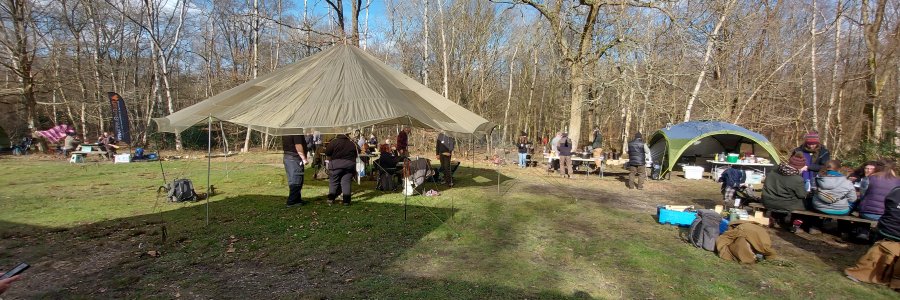The woodlands, hillsides and moorlands are natural and unstructured, and therefore are unpredictable.
We believe that spending time in the outdoors, engaged in some form of new experience such as skills learning or hiking across open landscape, really does help build positive personal characteristics including resilience, and we present our thoughts to you on achieving this, in this article.
The uncertainty of "the outdoors" is part of the attraction, at an inate level, for humankind - we seem to enjoy observing randomness (such as birds, clouds, water and flames), and this is often positively linked in studies as being a regulator for brain patterns. However, the uncertainty can trigger feelings of discomfort and avoidance, even prior to being in the environment, due to a lack of familiarity; this again is a fundamental cautiousness in humans, and which helps us to survive.
At Trex (and to quote our tagline) - "we enable you enjoy new adventures" - we strongly value and advocate learning skills in an informal and abstract yet safe environment, with structured guidance from a someone with experience. Our courses are predominantly offered for adult participants, as we believe there is a gap in providing this kind of opportunity and support for adults (beyond "forest schools" and Scouts for youngsters) - our approach is encouraging, not fiercely challenging. We want you to learn about and enjoy life in the outdoors, taking away feelings of pride and self-confidence, and newly adopted knowhow.
Comfort
For some people, they would prefer to know the geography and physical structure of the paths, and to avoid encounters with conflict (for example with creatures, mud, or wet weather) - at Trex, we entirely understand this, and hence provide information for what to expect up-front, will discuss the planned environment and practical elements for activities.
There is also within this abstract natural world a wealth of opportunity - there is freedom to explore physical areas or materials and tools, and to discover places, things and skills that you did not know previously, or had forgotten. This is what our age-old ancestors knew and took the benefits of, but we created more and more solidity (in buildings and processes of daily life), and over centuries, modern society began to retreat from comfort within an chaotic world.
Bushcraft learning, as guided by the Institute of Outdoor Learning, embraces the fundamental teaching of knowledge and skills from one person to another, through practical mentoring. The word mentoring is vital, as there is no definitive instruction set for what you will find and how to achieve what you want; instead, learning also includes patience, observation, reflection and practice.
Self-Awareness
Having had a role in mentoring in outdoor learning and engineering for about 15 years overlapping*, I have learned (and continue to learn) patience with myself, as a foundation. Being able to pause your own frustration with something (such as bow-drill for friction fire lighting, or having difficulty recalling Latin names for specific trees), will enable you to review how you are attempting something and consider whether alternatives would benefit, or whether you just need to try again.
Learning at a base level is about picking up new ways of doing things, and we highlight the word "new" there, which relates to the "comfort" discussed in our previous section, and also the topic of "patience". If we do not push beyond our comfort zone, we are highly unlikely to learn. Therefore, in order to learn, anyone must be able to understand the boundaries of their comfort zone, which is only achieved by testing it within a controlled manner.
(* 5 years formally in outdoor learning + guiding, overlapping with 15+ years as an engineer and STEM ambassador)
Development
The audience reading this article this may think the "self-awareness" is all very zen, and great in theory, but practically what can actually change.
My experience from my own learning and from watching course participants, is that with the right guidance and mentoring, the characteristics discussed above can all be happily achieved. This is particularly true in an outdoor environment, where appropriate personal, group and setting preparation is already established.
Outdoor spaces are also inherrently open - there are no imposed anchors (such as walls, desks, and displays), leaving the individual and guide to focus on skill development.
With the above in mind, it is down to the individual to be willing and interested to learn, and we at Trex understand that maybe that initial step of booking a day's course in relatively remote woodland (5 walk from a village) is the primary personal development.
We like to be clear about all potentials ahead, and be prepared together to adapt, but to meet them rather than avoid them where possible.
And so?
Encompassed within all this, we know (and have seen the real emotional joy and pride in) how our outdoor skills courses provide a blend of the following outcomes:
- escapism (refreshment from opportunity to spend time in a different environment without fixed boundaries of time or physical space)
- joy and intrigue at learning new things (such as how you must ask the Elder mother when cutting some wood to make a whistle)
- satisfaction in achievement (such as striking a firesteel, or making a spatula from a fresh log)
- onward inspiration (as knowledge learned is retained and passed to others)
- personal resilience (strengthened mindset from practical determination and reflection)
We are pleased to offer scheduled and bespoke courses, at our woodland base-camp or travelling to you.
Contact us, or see topics and courses available.
Further Reading
- High Quality Outdoor Learning - A Guide for All (IOL, 2025), https://www.outdoor-learning.org/standards/high-quality-outdoor-learning.html
- Outdoor Mental Health & Outdoor Therapy, https://www.outdoor-learning.org/standards/iol-professional-standards/outdoor-mental-health-outdoor-therapy.html
- "Surviving or Thriving" article (Kate O Brian, Horizon Magazine No74), https://outdoor-learning-research.org/Portals/0/Research%20Documents/Horizons%20Archive/H74%20Surviving%20or%20Thriving.pdf
- "Could Nature Contribute to the Management of ADHD in Children? A Systematic Review" (Maddison Hood and Oliver Baumann, 2024) https://pubmed.ncbi.nlm.nih.gov/38928982/

